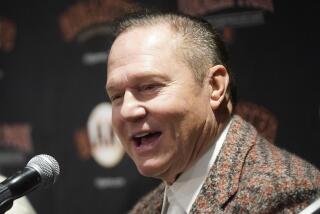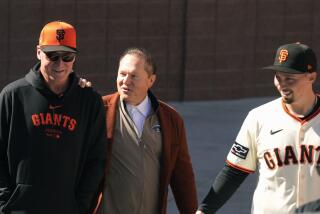Will Giants Balk, Let Bonds Walk?
- Share via
It is with awe, says Peter Magowan, managing general partner of the San Francisco Giants, that he watches Barry Bonds produce a historic season.
Awe is one thing. The larger question is how much is he willing to owe his prospective free agent when they sit down to negotiate a new contract at the end of the season.
“We’ve proven that we can compete with a mid-level payroll and we’re not going to take a $55-million payroll to $110 million for Barry Bonds or any other player,” Magowan said Monday from San Francisco.
Did he pull $110 million out of a hat?
Probably not. He was probably leveling a shot at the hated Dodgers, whose payroll is $110 million and counting.
“Maybe the Dodgers can go deep into the red with no one seeming to care,” Magowan said, “but we don’t have some large corporation willing to subsidize millions and millions in losses with no light at the end of the tunnel year after year.
“We’re also not the type ownership that, if things go bad financially in a couple years, we’ll decide to sell and make our profit that way. There’s too many owners who buy in with the idea of selling in two or three years. It’s what happened in Florida, in Oakland and, from what we hear, it’s what’s happening with Disney [and the Angels]. We bought the Giants to keep them in San Francisco, and I think there’s a lot to be said for an ownership group that goes about it sensibly.”
Who can make sense of Bonds’ explosive season at 37?
Those 67 homers, three shy of Mark McGwire’s 1998 record; the .499 on-base percentage, the .841 slugging percentage.
How to measure what he should be paid in a multiyear contract that will take him into his early 40s?
“Barry and Roger Clemens have rewritten the book,” agent Scott Boras said, meaning that age is no longer a relevant issue with the San Francisco left fielder and New York Yankee pitcher.
Perhaps, but the dollars definitely are.
Bonds is receiving $10.3 million in this final year of a three-year, $22.9-million contract and will have been paid $74.45 million in his nine years with the Giants.
He and Boras--and there is some question as to which is the heavier hitter--gave the Giants a shot at a hometown discount, similar to the five-year, $70-million contract that Jeff Bagwell got from the Houston Astros.
The Giants chose to wait, running the risk that Bonds would drive up the price, as he has. Now, Magowan said, he hopes to have the Bonds issue resolved within a few weeks after the season ends.
Boras objected, saying, “He can’t reject the offer of unilateral negotiations in the spring and then set an arbitrary deadline when Barry becomes a free agent.”
Said Magowan, “The key question is whether the Giants are better with Barry than without him, and I know that’s a silly question. What team wouldn’t be better with the game’s best player? But are we going to be able to sign Barry and afford to put a competitive cast around him? It’s all a function of the dollars.”
The situation, Magowan said, is similar to when the Giants had to choose between Bonds and Matt Williams and ultimately traded Williams to the Cleveland Indians for four players, one of them Jeff Kent, who helped lift the Giants from last to first in 1997.
“The second question,” Magowan said, “is, will we make the playoffs and go farther than we did last year [when the Giants were eliminated in the first round]? If we do better than we did last year, it gives us extra revenue and an extra boost to renewing our season-ticket sales. I also think it would give us more incentive to try and sign him.
“On the other hand, if we didn’t make the playoffs, you have to ask yourself, ‘OK, here’s this core group of players that have been together for three or four years and if we’re not good enough to make the playoffs, then maybe we have to go back to the drawing board and see what we can do differently. All I’m saying is that our chances of signing him are better if we make the playoffs, but that doesn’t mean we have decided not to sign him if we don’t.”
The Giants lead the majors in attendance and have played to sellout crowds for each of their two years in Pacific Bell Park. Their season-ticket base of 29,500 is the largest in the majors, and their 2000 revenue of $165 million was exceeded only by the Yankees and New York Mets.
Is Magowan concerned about the negative response if Bonds is allowed to leave?
“Of course,” he said. “But the Giants have pretty good credibility with our fans. They know we’ve made smart decisions. If the fans see we have a well-articulated and communicated plan as to how we would proceed without him, then I think they would accept it. To me, the bottom line is that you’re not going to get total agreement from the fans no matter which way you go.”
In the meantime, Magowan said he couldn’t be prouder or more excited about Bonds’ remarkable season.
“People say he doesn’t have the pressure that McGwire did in ‘98, but in some ways he has a lot more,” Magowan said. “He’s doing this in a pennant race, and McGwire didn’t. He’s doing it in an unbalanced schedule against teams we have to beat and that have to beat us to reach the playoffs. He’s doing it in a lineup in which some of his protection isn’t having as good a year as last year, and he plays his home games in a park not conducive to a left-handed slugger. He’s met every challenge, and the fact that it also happened just three years ago doesn’t detract from what he’s doing.”
That’s a clip-and-save for Boras. Then again, Bonds has said that he hopes to stay with the Giants, the team with which his father, Bobby Bonds, broke in and his godfather, Willie Mays, established his legend.
Bonds, of course, marches to the beat of his own bat, but Magowan said the player’s portrayal as an isolated and selfish figure in the clubhouse won’t affect his decision.
“Whatever the players feel about him individually, whether they go out to dinner with him or go over to his house during the season, which they may do with other players and don’t do with him, is immaterial. Whatever is written about him is no different than it was in 1993, when I first signed him, and we have the third-best record in baseball since then.
“I mean, we’ve seen other clubs that have self-destructed over personality problems, but that hasn’t happened with the Giants. The question is, what gives us the best chance to win.”
And how much will it cost?
More to Read
Go beyond the scoreboard
Get the latest on L.A.'s teams in the daily Sports Report newsletter.
You may occasionally receive promotional content from the Los Angeles Times.










